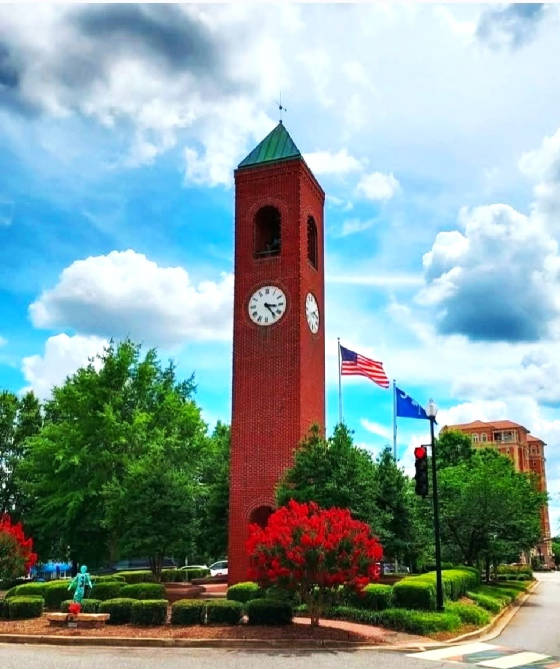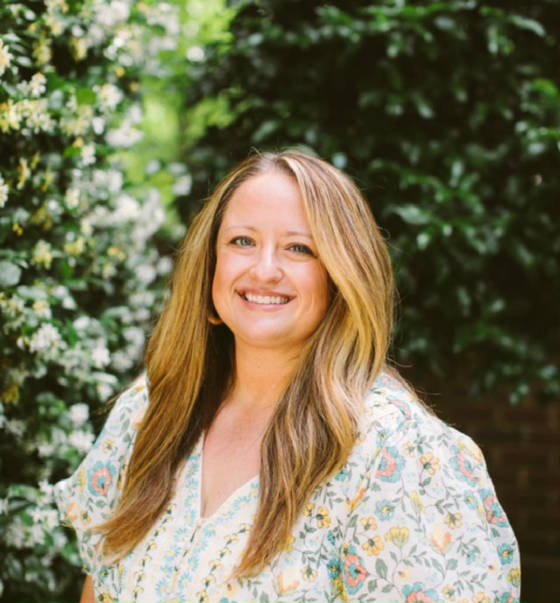
Photo courtesy: ****Al Schneidster for Support the Spartanburg Downtown Clock Tower
- Facebook****
Future of Clock Tower uncertain;
City not obligated to act in a specified time
Money to rebuild currently earmarked
to come from taxpayers
By L. C. Leach III for
The Spartan Weekly News
What was expected to be a definitive
agreement between opposing factions over Spartanburg’s recently dismantled Clock Tower is now at somewhat of an uncertain
crossroads.
On Oct. 8, 2025, officials with the City of Spartanburg and citizens against moving
the Tower from its site on West Main Street reached an agreement to allow the City to proceed with a new development on the
site, and to reconstruct the Tower in a new location.
The agreement came eight days after a temporary
injunction was filed before 7th circuit court judge Mark Hayes against the City by Kimberly Branch and a group called Support
the Spartanburg Clock Tower.
In the agreement, after City leaders determined that moving the Tower
intact would be too great a safety risk, Branch and supporters assented to withdraw the injunction and subsequent suit, in
exchange for the City consenting to dismantle and then rebuild the Tower and its historical elements on a new site, selected
by City Council, after a study involving feasible locations and public input.
But Branch and others
are now wondering when and if City officials will uphold their part of the bargain.
“I met
with City Mayor Jerome Rice prior to the Nov. 24 Council meeting for an update, and the City manager Chris Story said there
would be an announcement in January about the location,” Branch said. “But I haven’t heard from anyone since
then about a definite timetable moving forward.”
Local attorney Wesley Stoddard, whose father
was instrumental in getting the Tower erected, added that he too hasn’t had any indication.
“People
want to know where it’s going to go, and right now we don’t know,” said Stoddard, who helped negotiate the
terms of the settlement with the City. “Why haven’t we heard anything from the City manager to decide on a new
location?”
The concern by Stoddard and Branch is borne out partly by the language in the
settlement agreement, which says: ‘The City will in good faith move the project forward in a manner consistent with
prudent city planning, construction, design, and implementation principles.’
But because
the agreement does not specify a specific time frame for the Council to act, Charleston County attorney Blair Hahn pointed
out that the project could either be shelved indefinitely, or that City leaders could “drag it out.”
“The plaintiff, or perhaps another interested party, will need to go back to court and push the lack of ‘good
faith’ if the project doesn’t proceed,” Hahn said. “I would guess that it will never get built without
the public continuing to push the issue.”
He warned, however, that even if the project is
delayed for any period of time, proving a lack of good faith on the part of the City would be difficult.
“The city (manager) or the mayor could come up with all kinds of excuses as to why it is moving slowly until
the public forgets about it,” Hahn said. “Another issue will be the funds to do it. That could always be an obstacle
if any given budget doesn’t have room for it, yet the city in ‘good faith’ is trying to make it work.”
The tower was dismantled this past November to make way for a redesigned, West-Main streetscape plan at Morgan Square:
a development totaling $425 million to build a new 6-story, 152-room hotel; an adjacent office development called Fifth Third
Park; and another residential development.
Christopher George, the City’s communications
& engagement director, said that while he anticipates Council members taking up the matter of “establishing a site
for the rebuilt tower early this year,” he made it clear that no action will take place without Council approval.
“City Council will approve the rebuilding of the clock tower, including the site and timeline,” he said.
“We do not have a final cost estimate yet for the rebuilding. Once finalized, funding for the construction will come
from the City’s general fund.”
Which means that if this funding intention remains
unchanged, the rebuilding of the Tower would come at taxpayer expense.
But right now, Branch,
Stoddard, and many others are waiting for an answer about the Tower’s new home.
“I
would personally like to see the tower rebuilt several blocks over from West Main Street, on the site of the new courthouse
(erected in 2024),” Stoddard said. “The Clock Tower has become an iconic symbol representing the City –
$10,000 of the money used to build it in 1976-79 came from 20,000 school children in a penny-project. And even if it’s
on a new site, we want it to stay.”
Branch agreed that the courthouse site is her choice
as well – and while she and Stoddard and other Tower supporters are not technically protected by a time frame or a non-tax
funding source, they intend to see this matter through.
“I got 3,811 people to sign the
original petition to keep the Tower,” Branch said. “And we will do everything we need to in order to see that
it remains a visible part of our history and heritage.”
****Interested in commenting about
the future of the Clock Tower?****
The Spartanburg City Council’s next scheduled meeting
is 5:30 p.m., January 26, in County Council Chambers, 366 N. Church Street.
Launch Something
introduces Lift Off community for women entrepreneurs
Launch Something, a Spartanburg-based strategic
marketing firm, has launched Lift Off, a private online membership community designed for women transitioning from corporate
careers to entrepreneurship.
The new platform marks the firm’s first direct-to-consumer
offering after two decades of brand-building work for clients such as Denny’s franchise networks, Power Up Spartanburg
and regional nonprofits. Founder and owner Sims Bouwmeester said the initiative draws on the firm’s experience creating
communities that foster connection and growth.
“Time and again, we’ve seen that brands
endure when they facilitate meaningful connection,” Bouwmeester said. “Lift Off is us putting that belief into
practice.”
Lift Off is aimed at addressing what Bouwmeester calls the “isolation tax”
— the loss of support many women experience as they advance in business. Members gain access to education and peer support
around branding, marketing, pricing, sales, leadership and growth, with an emphasis on practical application and shared problem-solving.
In addition to structured programming, the community encourages collaboration between members through discussion
forums, live sessions and shared milestones, creating an environment where women can test ideas, exchange feedback and build
momentum together.
Built on the Mighty Networks platform, Lift Off combines courses, live events
and group discussions in a private, ad-free space. Bouwmeester, a 2025 Mighty Certified Expert, designed the community based
on Launch Something’s prior work in community development.
The launch of Lift Off comes
as more women leave traditional corporate roles to pursue independent ventures, a shift driven by changing workplace expectations
and increased access to digital tools. Bouwmeester said the community is designed to meet that moment by providing not only
education, but also consistency and accountability, helping members stay focused and connected as they build businesses on
their own terms.
Membership is now open at launchwith liftoff.com. Options include a five-day
2026 Planning Challenge for $29, a core membership for $79 per month, or a guided membership with implementation support for
$549 per month.

Unity Week Marchers brave the cold in the 2025 'Walk As One' event. Photo courtesy
of Kathy Hill
City readying for 39th annual
MLK Unity Week
By L. C. Leach III for The Spartan Weekly News
It began in 1987 as a brief, almost unnoticed gathering around a City Hall flagpole.
Now, as Spartanburg leaders and residents prepare to engage in the 39th annual Martin Luther King Unity Week Celebration,
the original gathering has not only grown into a City-wide tradition, it stands as one of its most important, annual signature
events.
“We don’t have real estimates, but overall participation will often exceed
5,000,” said Christopher George, communications & engagement director with the City of Spartanburg. “From
that first simple ceremony, the City’s recognition grew over the years to encompass the slate of events we produce and
support today.”
Running from Jan. 15-19, Unity Week will include:
•
Art Contest Reception – 5:30-7 p.m., Jan. 15, Chapman Cultural Center. Poster contest winners will be announced
at 6 p.m. in the Artists' Guild Gallery, and all student participants and their parents are invited to attend.
“I love to see the amount of artwork we receive in the gallery each year,” said Danielle Woodson, Arts
and Outreach Director with the Artists Guild of Spartanburg. “We usually have between 75-125 pieces submitted by students,
and it’s really great to see what they come up with.”
• Uniteen Takeover,
Jan. 16, Dr. TK Gregg Community Center.
• Kindness Day All Day Jan.
16. Everyone is encouraged to make extra efforts to be kind to someone on this day, as a springboard going forward.
• Walk As One – 9 a.m., January 17. This annual walk will begin at the Robert Hett Chapman
III Center for Philanthropy, 431 E. Kennedy St. Participants can enjoy a walk around the City and fellowship among community
members in the spirit of kindness. Refreshments, activities, and more will follow afterward.
•
Community Celebra-tion – 3 p.m., January 18, Spartanburg Memorial Auditorium. Keynote address will be from
motivational speaker Dr. Adolph Brown.
“The MLK Community Celebration draws people from
all ages to hear speakers and choir singing groups,” said Kathy Hill, Community Relations Manager for the City of Spartanburg,
now in her 15th year of coordinating Unity Week. “And we also have the three humanitarian awards to present to residents
in Spartanburg County.”
• MLK DAY OF SERVICE, January 19. Each year,
the United Way of Piedmont mobilizes hundreds of volunteers through meaningful action to honor Dr. King in the local community.
Ways of serving include mobile meals, a street clean, Upper Chinquapin Greenway Trail Beauti-fication, and Brothers
Restoring Urban Hope during their community basketball camp.
To volunteer, go to https://www.uwpiedmont.org/mlkday.
George pointed out that even before King’s birthday was declared a federal holiday in 1986, efforts were already
underway by citizens “to pay respect to what Dr. King and his mission meant for so many people in our community”
“I’m not totally certain who spearheaded the initial gathering 39 years ago, but many City staff members
have contributed over the years to it becoming what it is today,” George said.
Which is
not bad going for a small original gathering.
“The outcome is great, I enjoy coordinating,
and we have a good committee to work with,” Hill said. “Seeing it all come to fruition each year is for me what
it’s all about.”

A bookstore on wheels: How one local woman is bringing
stories back to the community
By Melissa Rhine for The Spartan Weekly News
In early 2025, Lindsey Oliver Mayes decided to do something many readers hope
to do each year: get back into reading. What started as a personal goal quickly turned into a business idea—and now,
a growing presence at pop-ups and events across the Upstate.
Bookin’ It is Lindsey’s
mobile used bookstore, created to make popular, in-demand books more affordable and accessible for local readers. After immersing
herself in Bookstagram and BookTok content and building an ever-growing “to be read” list, Lindsey went searching
for used copies of those titles at local shops.
“I decided to see if I could find the books
used at local shops for a good price, and unfortunately came up empty,” she said. “New book prices are so expensive,
so I wanted to provide a local outlet for people to get their most sought-after books at a discounted price.”
Rather than opening a traditional storefront, Lindsey took a more flexible—and community-focused—approach.
Bookin’ It pops up at seasonal markets, neighborhood events, and local businesses, bringing curated used books directly
to readers where they already gather.
Throughout December, Bookin’ It appeared at events
including Light Up Inman at Market on Mill and Winterfest in Tryon, where Lindsey says some of her favorite moments happen—not
just through sales, but through conversations.
“The most rewarding part is by far the conversations
I get to have with fellow book lovers,” she said. “When someone’s eyes light up when talking about a book
they’ve read, it literally makes my day. Us book people know that not everyone wants to hear about what you’re
reading—so when you find someone that’s genuinely interested, it means the world.”
Lindsey
is intentional about what she stocks, spending hours researching trends and reader feedback through Instagram, TikTok, Goodreads
newsletters, and direct input from customers. If readers are searching for a specific title, she makes it a priority to track
it down.
One of Bookin’ It’s most popular offerings is Lindsey’s “Blind
Date with a Book”—wrapped mystery selections that offer hints about the genre and vibe without revealing the title.
“A good ‘Blind Date with a Book’ is generally one that I’ve read personally and really liked,”
Lindsey said. “If it’s not one I’ve read, it’s a book I’ve seen overwhelmingly positive feedback
on across multiple sources. These are one of my biggest sellers.”
At a recent Winterfest
event in Tryon, Lindsey experienced a moment that perfectly captured why she loves what she does.
“A
couple walked up, and the woman started browsing while her husband named the exact book he wanted,” she recalled. “I
said, ‘Yes, it’s right here—and I’m selling it for only $6 in like-new condition.’ Being able
to hand him the exact book he wanted to give as a Christmas gift felt so good.”
While Bookin’
It continues to pop up around the Upstate, Lindsey has also spent time expanding her online presence. Her website now functions
as a fully operational shop, with nearly 1,000 titles available, along with mystery books and local delivery options.
Looking ahead to 2026, Lindsey plans to return to successful events, add new pop-up locations, and continue growing
her inventory—often sourced directly from the community.
“My best resource for stocking
inventory is buying books from individuals in the community,” she said. “If you have like-new books you want to
sell, reach out.”
Bookin’ It can be followed on Instagram @bookinit_sc, and books
can be purchased online at bookinitsc.square.site.


Melissa Rhine
Meet
Your Neighbor: Melissa Rhine on creativity, community, and calling Spartanburg home
Meet Your Neighbor is a weekly feature by Spartan Weekly News writer Grace
Anne Johnson. If you’d like to be featured, or know someone that would be a great candidate to be featured, please email
us at [email protected] or call 864.574.1360.
***
They
say that you can’t do it all, but Melissa Rhine just might be proving that wrong.
The mom
of three was born and raised in Spartanburg, and has spent nearly her whole life local. Rhine spent a few years in Columbia
to attend college for USC, but came back to Spartanburg immediately after graduation — it just felt like home.
She and her husband have since bought and renovated two homes in Spartanburg, which has made their family feel even
more deeply rooted in the Spartanburg community. When asked what it is that makes the area feel so special, she immediately
cites the people.
“We love that Spartanburg is big enough to have great food, events, and
opportunities, but not so big that it loses its sense of connection. Most people are genuinely kind, and there’s a strong
sense of community here that’s really special. It’s a great place to raise a family and build something meaningful.”
And that’s exactly what she’s doing. Rhine’s life is never dull. In addition to caring for her
three children, ages 7, 5, and 2, which she says keeps life busy “in the best way,” Rhine also works as the Managing
Editor of Belle Magazine, a magazine for the modern Southern woman headquartered here in Spartanburg. “I get to work
closely with small business owners, creatives, and brands throughout the Upstate,” she shares. It’s exciting,
fulfilling work that keeps her busy amidst the many demands of motherhood. “My days are a mix of work, school drop-offs,
sports practices, deadlines, emails, and squeezing in family time whenever I can,” she says. “It’s full,
fast-paced, and rarely quiet, but I really love this season of life.”
While so many women
feel torn between being mothers and pursuing their careers, Rhine says investing in both sides is what makes her life so special.
“I absolutely love my kids and the ages they’re in right now,” she says. “It can feel like
total chaos some days, but it’s also incredibly fun and sweet. I also really love the work I get to do — curating
content, writing articles, and helping tell the stories of people and businesses in our community. Being able to do creative
work while still being present for my family is something I don’t take for granted.”
Rhine
shares that there are two driving forces behind her work: creativity and community. “I love storytelling, whether that’s
through writing, design, or social media, and I really enjoy helping small businesses and creatives feel seen. I’ve
also always loved home decor and renovation projects, cooking, entertaining, and finding inspiration in everyday life —
those things have always fueled my creativity.”
Stepping into 2026, she’s excited
to lean even further into that creativity in all aspects of her life, from home projects to kitchen experimentation, creating
simply for the enjoyment of it and letting herself explore ideas without pressure. It’s easy when working in a creative
field to lose your spark, but Rhine is eager to keep joy at the forefront of it all. She also hopes to get outside more in
the new year and be more intentional about slowing down when she can.
Professionally, she’s
excited to continue shaping stories, expanding her skill sets, and doing work that feels both meaningful and creative, while
also finding her balance as both a present mom and a professional contributor. If anyone can do it, it’s Rhine —
with connection continuing to be the hallmark of it all.
Know
someone who should be featured? Nominate them via email at [email protected] or call 864.574.1360.

